- Judging Covers with The Husband, first edition
- Judging Covers with The Husband, third edition
- Judging Covers with The Husband, second edition
- Judging Covers with The Husband, fourth edition
- Judging Covers with The Husband, fifth edition
- Judging Covers with The Family, sixth edition
- Judging Covers with The Family, seventh edition
- Judging Covers with The Family, eighth edition
- Judging Covers with The Family, ninth edition
- Judging Covers with The Family: It’s Back
- Judging Covers with The Family: The return
It’s been awhile since I’ve done one of these and The Child was begging and I can’t stand that sound so here were are. Let’s all be enlightened.
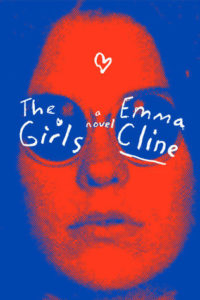
Book #1: The Girls by Emma Cline
The Child says: I think it’s about some criminal girls who don’t want to be arrested and they always wear sunglasses so the police can’t identify them.
The Husband says: (Jana’s note–he mulled this one over for a very long time. I formatted the rest of the post while I waited) To me, it’s a ripoff of Almost Famous but if I’m having to think what it’s about since it’s obviously not that, it makes me think it’s about girls who are sweet but are not really. They’re really dark.
Goodreads says: Northern California, during the violent end of the 1960s. At the start of summer, a lonely and thoughtful teenager, Evie Boyd, sees a group of girls in the park, and is immediately caught by their freedom, their careless dress, their dangerous aura of abandon. Soon, Evie is in thrall to Suzanne, a mesmerizing older girl, and is drawn into the circle of a soon-to-be infamous cult and the man who is its charismatic leader. Hidden in the hills, their sprawling ranch is eerie and run down, but to Evie, it is exotic, thrilling, charged—a place where she feels desperate to be accepted. As she spends more time away from her mother and the rhythms of her daily life, and as her obsession with Suzanne intensifies, Evie does not realize she is coming closer and closer to unthinkable violence, and to that moment in a girl’s life when everything can go horribly wrong.
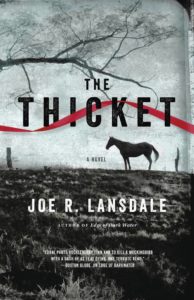
Book #2: The Thicket by Joe R. Lansdale
The Child says: About a really creepy man who wears a cloak over him and brings a horse out into the middle of this creepy, abandoned place which is kind of like the place where The Lorax takes place but scarier. It probably smells. His horse doesn’t like it very much.
The Husband says: It’s definitely not a happy book. And (insert maniacal giggle) there’s definitely a horse involved in some way. And things are going to get thorny. Get it? THICKET! And the horse isn’t going to make it out.
Goodreads says: Jack Parker thought he’d already seen his fair share of tragedy. His grandmother was killed in a farm accident when he was barely five years old. His parents have just succumbed to the smallpox epidemic sweeping turn-of-the-century East Texas–orphaning him and his younger sister, Lula.
Then catastrophe strikes on the way to their uncle’s farm, when a traveling group of bank-robbing bandits murder Jack’s grandfather and kidnap his sister. With no elders left for miles, Jack must grow up fast and enlist a band of heroes the likes of which has never been seen if his sister stands any chance at survival. But the best he can come up with is a charismatic, bounty-hunting dwarf named Shorty, a grave-digging son of an ex-slave named Eustace, and a street-smart woman-for-hire named Jimmie Sue who’s come into some very intimate knowledge about the bandits (and a few members of Jack’s extended family to boot).
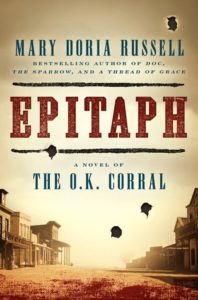
Book #3: Epitaph by Mary Doria Russell
The Child says: This town that goes to war in the middle of the 1800s. And when they’re going to war, a cannonball gets out of control and makes a hole in the sky. Then people gets telescopes and try to study what’s in outer space based on those holes.
The Husband says: Definitely about those Wyatt Earp days and all the death that probably happened around there. Things were so crazy that they even shot up a saloon that had a picture of the town.
Goodreads says: A deeply divided nation. Vicious politics. A shamelessly partisan media. A president loathed by half the populace. Smuggling and gang warfare along the Mexican border. Armed citizens willing to stand their ground and take law into their own hands…
That was America in 1881.
All those forces came to bear on the afternoon of October 26th when Doc Holliday and the Earp brothers faced off against the Clantons and the McLaurys in Tombstone, Arizona. It should have been a simple misdemeanor arrest. Thirty seconds and thirty bullets later, three officers were wounded and three citizens lay dead in the dirt.
Wyatt Earp was the last man standing, the only one unscathed. The lies began before the smoke cleared, but the gunfight at the O.K. Corral would soon become central to American beliefs about the Old West.
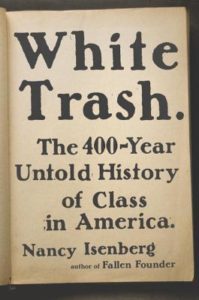
Book #4: White Trash: The 400-Year Untold History of Class in America by Nancy Isenberg
The Child says: Pass because I don’t understand it (when explained to her this was nonfiction and she struggled with the concept of class as an economic/social status rather than an actual class)
The Husband says: It should say “this book will discuss the following”. That’s the only other thing it can do.
Goodreads says: The wretched and landless poor have existed from the time of the earliest British colonial settlement. They were alternately known as “waste people,” “offals,” “rubbish,” “lazy lubbers,” and “crackers.” By the 1850s, the downtrodden included so-called “clay eaters” and “sandhillers,” known for prematurely aged children distinguished by their yellowish skin, ragged clothing, and listless minds.
Surveying political rhetoric and policy, popular literature and scientific theories over four hundred years, Isenberg upends assumptions about America’s supposedly class-free society––where liberty and hard work were meant to ensure real social mobility. Poor whites were central to the rise of the Republican Party in the early nineteenth century, and the Civil War itself was fought over class issues nearly as much as it was fought over slavery.
Reconstruction pitted “poor white trash” against newly freed slaves, which factored in the rise of eugenics–-a widely popular movement embraced by Theodore Roosevelt that targeted poor whites for sterilization. These poor were at the heart of New Deal reforms and LBJ’s Great Society; they haunt us in reality TV shows like Here Comes Honey Boo Boo and Duck Dynasty. Marginalized as a class, “white trash” have always been at or near the center of major political debates over the character of the American identity.
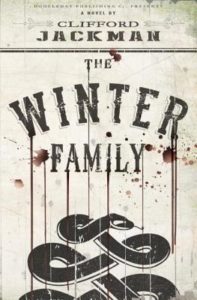
Book #5: The Winter Family by Clifford Jackman
The Child says: I think that, based off of the blood, it is about people fighting for their rights (Husband: to party?) and when they’re fighting, there’s this snakes that comes around and starts killing people
The Husband says: It’s about a family called the Winter family and they are (long pause)…they have a business and they ship stuff in the 1800s and people try to steal from them but they fight back, protecting their company’s stuff.
Goodreads says: Spanning the better part of three decades, The Winter Family traverses America’s harsh, untamed terrain, both serving and opposing the fierce advance of civilization. Among its twisted specimens, the Winter Family includes the psychopathic killer Quentin Ross, the mean and moronic Empire brothers, the impassive ex-slave Fred Johnson, and the dangerous child prodigy Lukas Shakespeare. But at the malevolent center of this ultraviolent storm is their cold, hardened leader, Augustus Winter—a man with an almost pathological resistance to the rules of society and a preternatural gift for butchery.
From their service as political thugs in a brutal Chicago election to their work as bounty hunters in the deserts of Arizona, there’s a hypnotic logic to Winter’s grim borderland morality that plays out, time and again, in ruthless carnage.
Jana says: is it obvious I have a theme going on?
Have you guys read any of these? What’d you think? I should have my opinion on them for the next Show Us Your Books on September 13th.


Jesus, Mary , and Joseph! I was not aware of that sterilization movement ! I guess you learn forever.
Even on the other side. Good God, Teddy Roosevelt.
Anyway, love this series.
Love, Steph’s Momma
Every time I see that first book, I also think of Almost Famous so I’m with the Husband on that one
I loved the child’s description of The Thicket. “It probably smells” made laugh. And I haven’t had coffee yet, but when I read the child’s description of Epitaph, I thought it sounded really interesting and I should put it on my TBR. Then I remembered it was her guess. Sigh. She should write books; they would be highly entertaining!
Tanya @ A Mindful Migration recently posted…August Recap
I love your daughters description of what she thinks The Thicket is about, especially with the Lorax thrown in there! I’m really interested in The Thicket based on the Goodreads description too, especially since it’s based in Texas. I can’t wait to hear what you thought of the actual book!
Hahaha I have to laugh that your husband takes this job very seriously and thinks on things for awhile. His thorny humor cracked me up too. And clearly The Thicket smells.
The child’s answer for Epitaph is the best answer of all-time answers! And, the husband’s input about fighting for the right “to party”.
I can not wait until SUYB because I want to hear your thoughts on all of these.
texerinsydney recently posted…What’s New With You (or me)